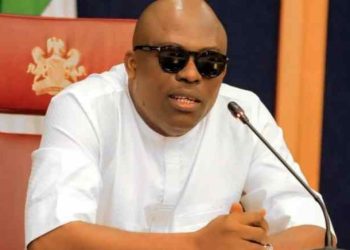The Niger Delta Development Commission (NDDC), has explained that it has signed a basic MOU with a US-based company to commence the preliminary processes of feasibility and viability of rail project to connect the nine states in the Niger-Delta region at a PPP Summit held in Lagos last Tuesday.
The Commission noted that the MOU “did not include an agreement on details, such as Engineering, Procurement and Construction (EPC), contract”.
In a statement signed by Dr. Ibitoye Abosede, Director, Corporate Affairs, NDDC, Friday, “all we signed at the PPP Summit was a basic MOU to commence the preliminary processes of feasibility and viability of the rail project. It did not include any agreement on details”.
Abosede explained that the Commission was compelled to issue the clarification because “we have been inundated with enquiries over what is ordinarily one of the preliminary steps necessary for the actualization of a partnership arrangement with the private sector”.
The Director added that “the need to be seen to be accountable and transparent as it collaborates with its stakeholders in the arduous task of developing the Niger Delta region,” compelled it to do so.
According to the statement: “At the Public Private Partnerships, PPP, Summit which we organised in Lagos on Tuesday, April 25, 2023, we signed a Memorandum of Understanding, MOU, with a United States-based firm, Atlanta Global Resources Inc., AGRI to build a railway network that will connect the nine states of the Niger Delta region.
“This foundational process may have been misconstrued by some persons to mean that the NDDC has signed the Engineering, Procurement and Construction, EPC, contract.
“It is only after the preliminary studies, that the finance appraisals will be done and then the civil engineering procurements and the locomotive hardware will be considered.
“For those who may not know, the Atlanta Global Resources Inc deals with financing for Industrial products, infrastructure projects, agriculture equipment, capital equipment financing etc. They came recommended by a reliable US financial institution, especially for the deployment of US-produced locomotives.
“The NDDC is aware that a partnership agreement of a massive project such as a railway network involves many international and national financial protocols.
“It has many ramifications at the highest level of government.
“It is also not unaware of the Federal Government contract of 2021 for rail line construction, however the proposed network covered by the MOU is on a different alignment”.
The statement added that, “many things will be involved and it comes in the mold of the NLNG train 7.
“Again, the ICRC and the Nigerian Railway Corporation, NRC, as well as the Ministry of Transport will be part of the negotiations.
“In addition, EPC contractors and hundreds of other international consultants will be involved.
“We are also aware that there must be sovereign guarantees which can only be granted by the Federal Government, after which it will seek the approval of the National Assembly.
“What we signed on April 25 is simply the opening phase that will determine how far we will go, but it definitely showcases how interested the international partners are in tapping into the Niger Delta region. They are swarming in droves.
“This indicates that we are looking at a bright and prosperous Niger Delta from the prism of the PPP”.
De. Abosede explained they are aware there will be challenges, especially at this initial stage, “but that will not discourage us in any way.
“Understandably, going public to celebrate our little success is attracting bigger investors and interests. Out of ten, one or two might be successful to the benefit of the region.
“The prospects of realizing the rail network are very good and we are confident that we will succeed ultimately”.
He stated that “the current Board and Management of the NDDC have resolved to do things differently so as to effectively drive sustainable development in the Niger Delta region.
“To give effect to this, we decided to use the PPP model to provide alternative sources of funding for key development projects and programmes.
“We urge our stakeholders to give us the necessary support to ensure that we all succeed in this venture, the Commission stated.







